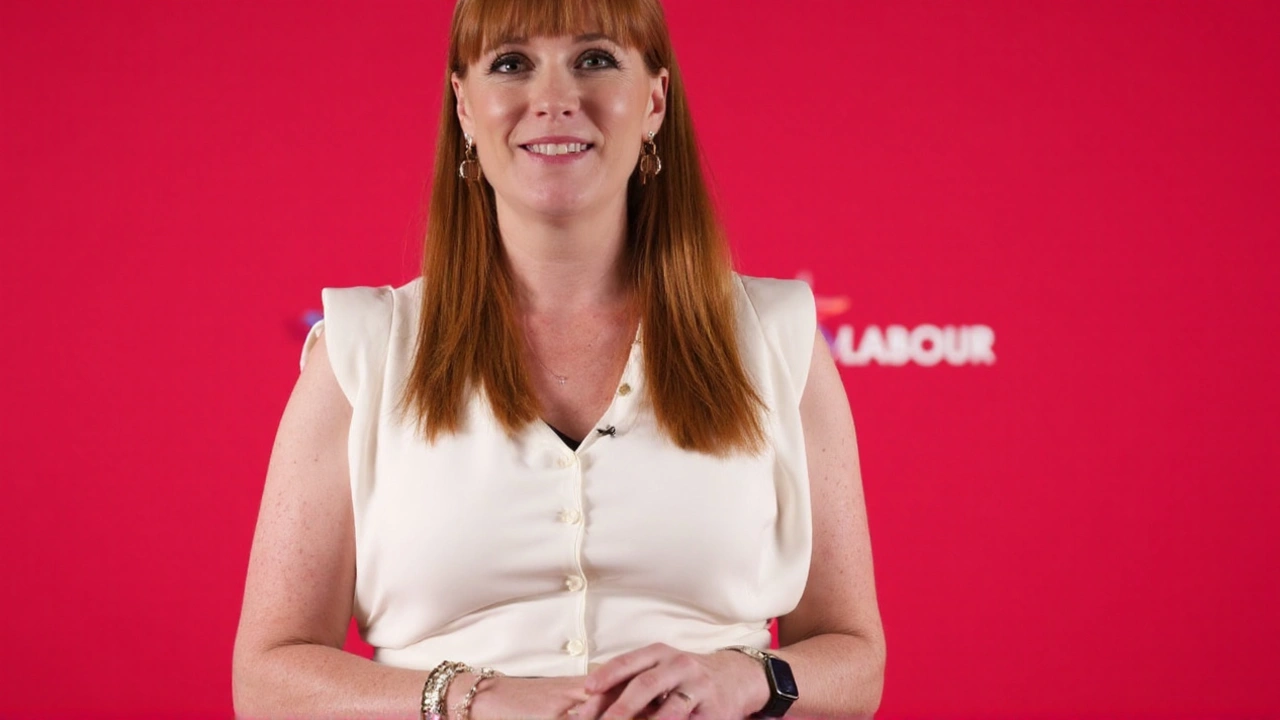From council estate to the Cabinet table
Angela Rayner has lived the kind of political arc Britain rarely sees: teenage mum who left school at 16, care worker turned union rep, then Deputy Prime Minister in a Labour government — before stepping down over a stamp duty finding little more than a year later. She remains the MP for Ashton-under-Lyne, a role she has held since 2015, and still carries serious weight inside Labour.
Born Angela Bowen on March 28, 1980, she grew up in Stockport and attended Avondale School. She left formal education at 16 when she became pregnant. Rather than drift out of the system, she retrained in social care at Stockport College and took a job as a care worker with the local council. That work — long shifts, low pay, and intimate contact with vulnerable people — hardened her views about what the state does well, and where it fails.
Her route into politics ran through Unison, the public sector union. First as a workplace rep and then a full-time organizer, she bargained, campaigned, and knocked on doors for members who felt ignored. Unison gave her two things: a platform to speak plainly about class and work, and a network that later powered her through selections and internal elections. She joined Labour out of that tradition — social justice, collective bargaining, and the belief that government should tilt the field back toward workers.
In 2014, local members in Ashton-under-Lyne selected her as Labour’s candidate. A year later she won the seat, holding a long-time Labour stronghold that had still felt the chill of deindustrialization. In Westminster, she quickly built a profile as a direct communicator who would take a fight to opponents and defend her own side on the airwaves.
Her first big platform came under Jeremy Corbyn. From 2016 to 2020 she served in the Shadow Cabinet, most prominently as Shadow Education Secretary. She pushed on skills, further education, and early years support — a natural fit for someone who’d left school early and returned through vocational routes. The brief showcased her ability to bridge union halls, town halls, and TV studios.
By 2020 she was running for Labour’s deputy leadership. She won, pitched as a soft-left, practical socialist who could connect the leadership’s Westminster instincts with the party’s organizing muscle. She became one of Keir Starmer’s most visible allies, taking on cross-cutting roles and acting as a political fixer during the party’s rebuild.
Labour’s victory in 2024 brought the jump to executive power. On July 5, 2024, Starmer named her Deputy Prime Minister and Secretary of State for Housing, Communities and Local Government — making her only the second woman to serve as Deputy Prime Minister. The brief came with weighty promises: turbocharge housebuilding, unblock planning, improve renters’ rights, and steady council finances after years of strain.

The property row, the Ministerial Code, and what comes next
The fight that would eventually end her time in government started years earlier. In 2007, Rayner bought her former council flat under Right to Buy. She later sold it for more than she paid. Opponents argued she might have owed Capital Gains Tax, depending on whether it was her main residence and how her family arrangements affected tax status after her 2010 marriage to Mark Rayner, a fellow Unison official. Capital Gains Tax generally doesn’t apply to your main home, but disputes often hinge on residence tests and timelines.
The issue stayed alive in the press and among Conservative critics. An unauthorized biography by Lord Ashcroft and complaints raised by Conservative deputy chairman James Daly added heat. Greater Manchester Police investigated and concluded she had committed no offence. That could have ended it, but the glare didn’t fade — especially once she entered government.
The final blow came on September 5, 2025, when a government report concluded she had breached the Ministerial Code over underpaying stamp duty on a property purchase. Stamp Duty Land Tax is a liability that follows set thresholds; underpayments are typically resolved by paying what’s owed plus any penalties. But the Ministerial Code is a higher bar: ministers must meet not just the law but the standards expected of public office. Rayner resigned the same day from her posts as Deputy Prime Minister and Housing Secretary.
The finding didn’t reopen the earlier criminal question — police had already said there was no offence. Instead, it landed where Westminster’s ethics system often does: propriety rather than criminality. For a senior minister, that was politically fatal. For Labour, it was a sharp loss at the top of government, and a blow to a housing agenda that had become central to the party’s pitch on growth, fairness, and rebuilding public services.
Rayner’s political identity has always been clear. She calls herself a socialist and sits in Labour’s soft-left family. She wears her background openly: care worker, trade unionist, and a product of further education rather than university. That makes her a rare bridge between Labour’s parliamentary elite and the movement’s organizing base — the world of shop stewards, picket lines, and community campaigns.
Inside government, she pushed for pace on housing supply and planning reform, arguing that productivity, living standards, and local renewal all depend on building more homes. The housing brief also fit her local government instincts: restore financial stability to councils, improve basic services, and tackle rough sleeping with integrated support rather than short-term fixes.
The property dispute also threaded through her private life. Her 2010 marriage to Mark Rayner — a Unison official like her — became part of the tax questions raised by critics. Their shared union roots were central to her politics, even as the personal details fed the media cycle that eventually consumed her position in government.
Beyond Westminster, her profile went global in late 2024 when she appeared on the BBC 100 Women list, which highlights influential and inspiring women around the world each year. It was a nod to her personal story as much as her political clout: a woman who challenged the idea that you need a degree and polished networks to reach the state’s top table.
Where does this leave her? She’s still an MP with a national following, deep ties to the unions, and a record of cutting through on broadcast media. She won’t control Whitehall levers for now, but few doubt she can set the tone on issues she owns — social care, skills, early years, secure work, and the dignity of frontline public sector jobs.
A row about tax can end a ministerial career; it doesn’t erase a political base. In Labour’s world, organizers matter as much as office-holders. If she wants to, Rayner can tour workplaces and town halls, help candidates in marginal seats, and shape the party’s language on class, the cost of living, and what “security” means for working families.
The episode also points to a broader truth about 21st-century British politics. Personal finances and property rules sit under a microscope — from Right to Buy to capital gains and stamp duty — and the standards for ministers are uncompromising. Voters might forgive complexity, but they rarely forgive sloppiness from people in charge. That gap between legal outcomes and ethical expectations is exactly where ministerial careers often break.
Her allies see a fighter who can still connect in places politics usually washes over: care homes, FE colleges, logistics depots, and bus depots at dawn. Her critics see a politician who should have been more careful with paperwork long before she took a red box. Both things can be true at once.
For the government, her departure raises practical questions. Who carries the housing agenda’s day-to-day grunt work? Can momentum on planning reform survive the reshuffle? Does a changed top team soften or harden the push to build — and where? Housing is the hinge for growth, and Labour knows it. The next months will show if the machine can keep pace without one of its most forceful operators.
Rayner’s future will be decided by patience and timing. Westminster careers often have second acts. If she steadies on the back benches, keeps her constituency close, and helps deliver wins for the party, the door back to high office won’t be locked. For now, she is a big figure outside the Cabinet rather than a fallen star outside politics.
Key moments in her path so far:
- 1980: Born Angela Bowen in Stockport.
- Mid-1990s: Leaves school at 16 after becoming pregnant; later trains in social care.
- 2007: Buys her former council flat under Right to Buy.
- 2010: Marries Mark Rayner, a Unison official.
- 2014–2015: Selected as Labour candidate; elected MP for Ashton-under-Lyne.
- 2016–2020: Serves in the Shadow Cabinet, including as Shadow Education Secretary.
- 2020–2025: Elected and serves as Labour’s deputy leader.
- July 5, 2024: Appointed Deputy Prime Minister and Secretary of State for Housing, Communities and Local Government.
- December 2024: Named to the BBC 100 Women list.
- September 5, 2025: Government report finds a Ministerial Code breach over underpaid stamp duty; she resigns from government.
Strip away the noise and the core of her story remains: she rose because she spoke plainly about work, care, and class — and because unions and members trusted her with the megaphone. That doesn’t vanish with one resignation. The question, as ever in politics, is what she does with the time she now has.





